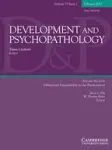[article]
| Titre : |
Arrested development: The effects of incarceration on the development of psychosocial maturity |
| Type de document : |
texte imprimÃĐ |
| Auteurs : |
Julia DMITRIEVA, Auteur ; Kathryn C. MANAHAN, Auteur ; Elizabeth CAUFFMAN, Auteur ; Laurence STEINBERG, Auteur |
| AnnÃĐe de publication : |
2012 |
| Article en page(s) : |
p.1073-90 |
| Langues : |
Anglais (eng) |
| Mots-clÃĐs : |
Isolement |
| Index. dÃĐcimale : |
PER Périodiques |
| RÃĐsumÃĐ : |
Improvements in temperance, perspective, and responsibility are a part of typical development of psychosocial maturity during adolescence. The existing literature suggests that the developmental course of psychosocial maturity is influenced by normative variations in social context, but little is known about how atypical contexts, such as incarceration, influence its development. The study investigates how the development of psychosocial maturity is affected by incarceration, using data from a 7-year longitudinal study of 1,171 adolescent males. We compared the effects of confinement in juvenile facilities with varying degrees of focus on incarceration versus rehabilitation (i.e., secure vs. residential treatment facilities) and tested whether facility quality and age at incarceration moderate the effect of incarceration on psychosocial maturity. The results indicate that incarceration in a secure setting, but not a residential treatment facility, is associated with a short-term decline in temperance and responsibility. The total amount of time incarcerated in a residential treatment facility, but not a secure setting, had a negative effect on the developmental trajectory of psychosocial maturity. Age at incarceration, but not the facility quality, moderated the effect of recent incarceration: older youths were more susceptible to short-term negative effects of recent incarceration in a secure setting, but they also benefited more than younger participants from short-term positive effects of incarceration in a residential treatment setting. Furthermore, youths who perceived their incarceration setting as unsafe evinced a decline in temperance. Future research and policy implications are discussed. |
| En ligne : |
http://dx.doi.org/10.1017/S0954579412000545 |
| Permalink : |
https://www.cra-rhone-alpes.org/cid/opac_css/index.php?lvl=notice_display&id=178 |
in Development and Psychopathology > 24-3 (August 2012) . - p.1073-90
[article] Arrested development: The effects of incarceration on the development of psychosocial maturity [texte imprimÃĐ] / Julia DMITRIEVA, Auteur ; Kathryn C. MANAHAN, Auteur ; Elizabeth CAUFFMAN, Auteur ; Laurence STEINBERG, Auteur . - 2012 . - p.1073-90. Langues : Anglais ( eng) in Development and Psychopathology > 24-3 (August 2012) . - p.1073-90
| Mots-clÃĐs : |
Isolement |
| Index. dÃĐcimale : |
PER Périodiques |
| RÃĐsumÃĐ : |
Improvements in temperance, perspective, and responsibility are a part of typical development of psychosocial maturity during adolescence. The existing literature suggests that the developmental course of psychosocial maturity is influenced by normative variations in social context, but little is known about how atypical contexts, such as incarceration, influence its development. The study investigates how the development of psychosocial maturity is affected by incarceration, using data from a 7-year longitudinal study of 1,171 adolescent males. We compared the effects of confinement in juvenile facilities with varying degrees of focus on incarceration versus rehabilitation (i.e., secure vs. residential treatment facilities) and tested whether facility quality and age at incarceration moderate the effect of incarceration on psychosocial maturity. The results indicate that incarceration in a secure setting, but not a residential treatment facility, is associated with a short-term decline in temperance and responsibility. The total amount of time incarcerated in a residential treatment facility, but not a secure setting, had a negative effect on the developmental trajectory of psychosocial maturity. Age at incarceration, but not the facility quality, moderated the effect of recent incarceration: older youths were more susceptible to short-term negative effects of recent incarceration in a secure setting, but they also benefited more than younger participants from short-term positive effects of incarceration in a residential treatment setting. Furthermore, youths who perceived their incarceration setting as unsafe evinced a decline in temperance. Future research and policy implications are discussed. |
| En ligne : |
http://dx.doi.org/10.1017/S0954579412000545 |
| Permalink : |
https://www.cra-rhone-alpes.org/cid/opac_css/index.php?lvl=notice_display&id=178 |
|  |


